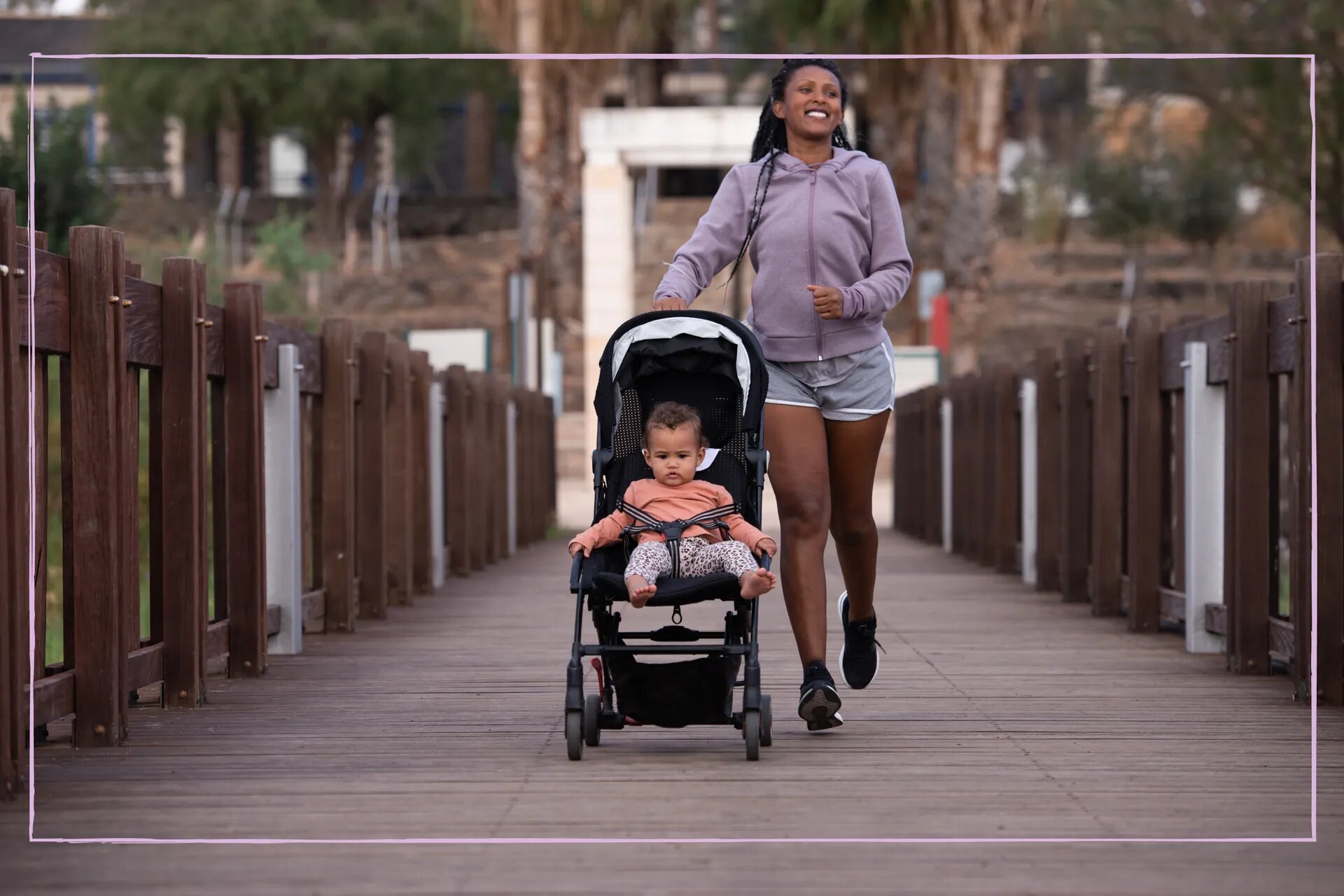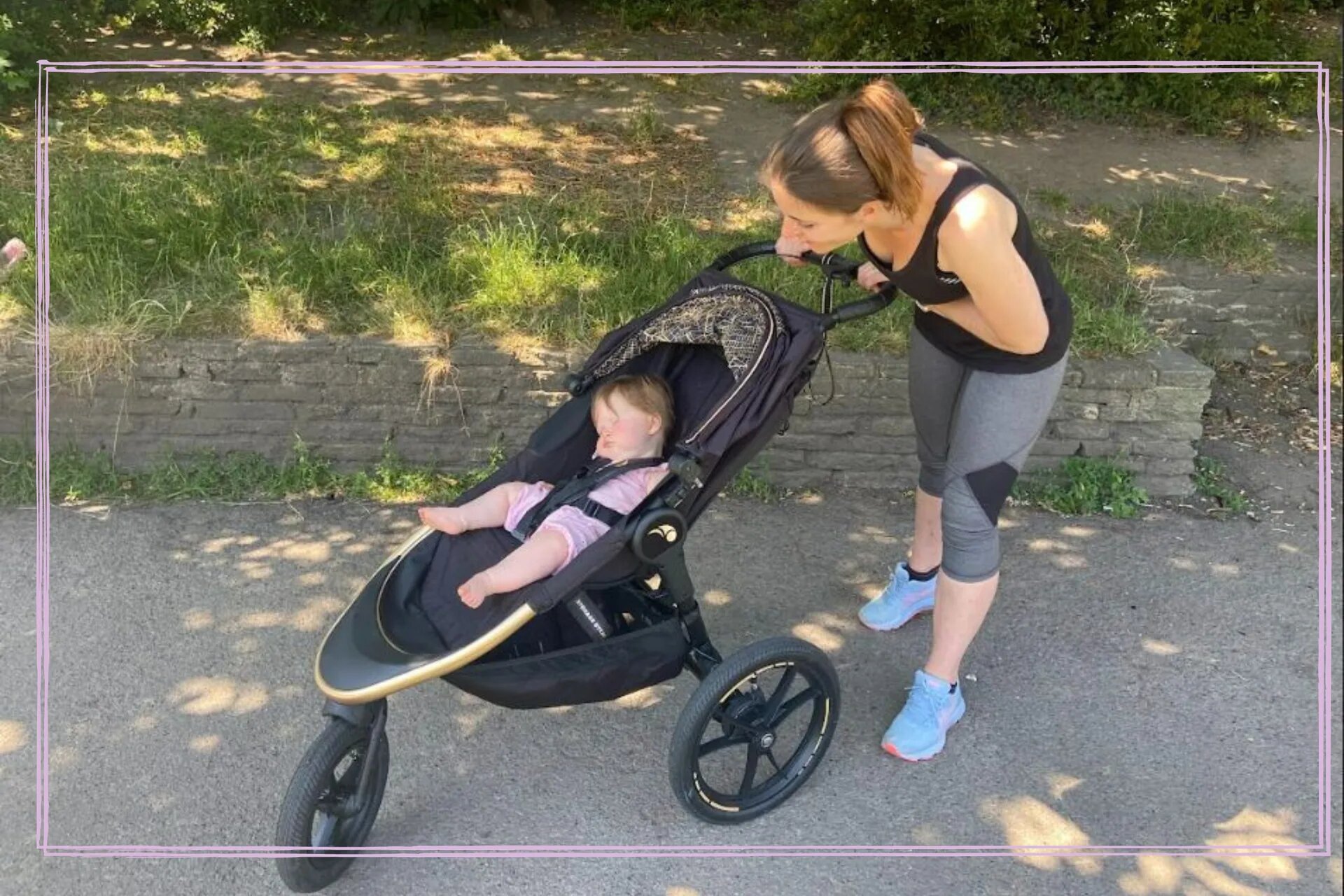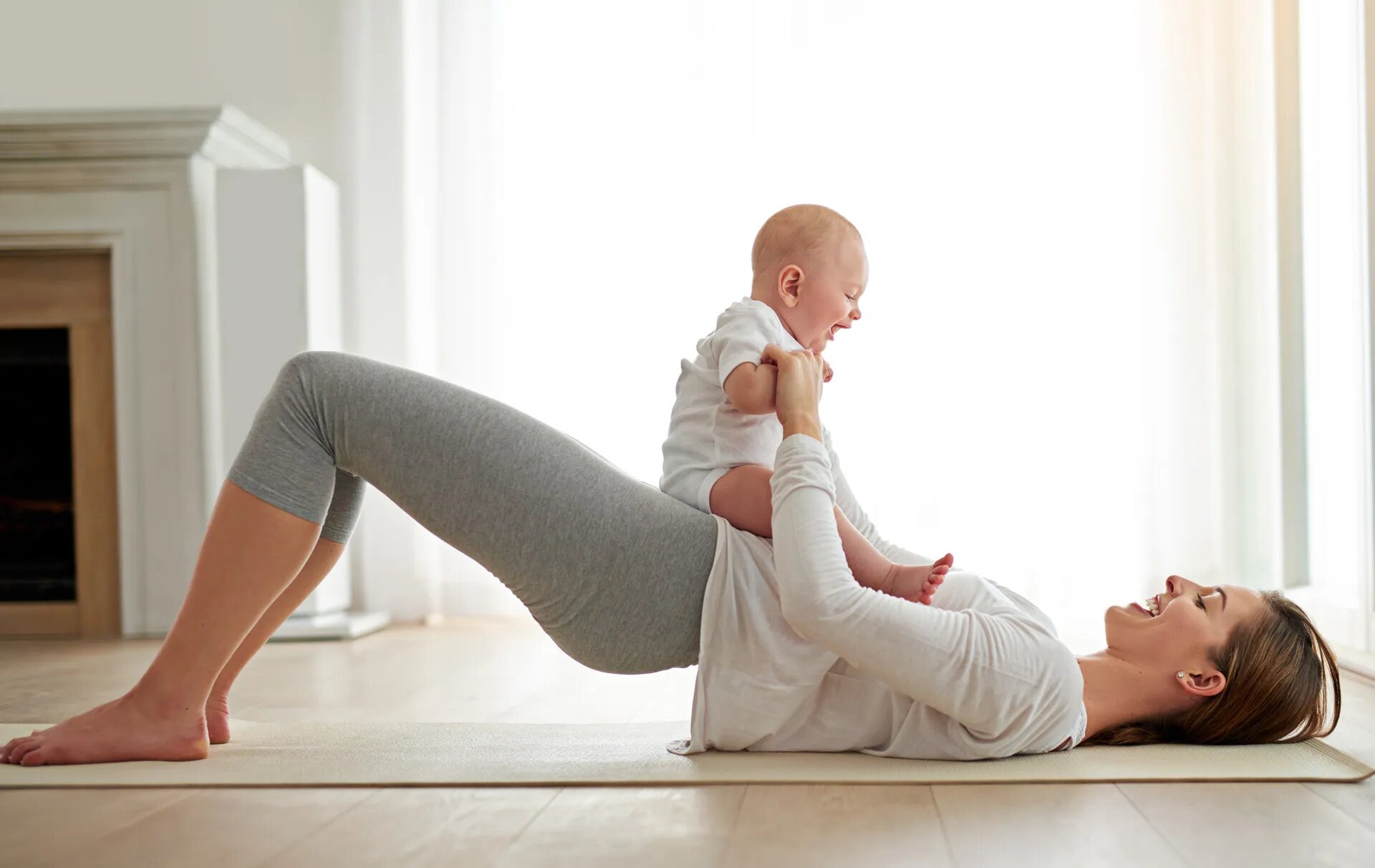Why Couch to 5k is a great workout for busy mums – 5 expert tips for new runners, plus what to avoid
Take the steps to get back into running at your own pace with the Couch to 5k challenge


Being a busy mum makes it difficult to find time to exercise, but the good news is anyone can do the Couch to 5k challenge.
If you're keen to learn how to start running, the Couch to 5k plan is designed for complete beginners or those who want to start their postnatal exercise journey after having a baby. We understand fitting in a weekly gym session or swim can be difficult as a busy mum – but with running, you're straight out of the door. If you've been given the all-clear from your GP to exercise, and you're keen to start running with a pram, our Baby Jogger Summit X3 review may come in handy if you're on the hunt for a buggy that's suitable.
"Making time for yourself as a mum can be really tricky – we spend all our time caring for our little ones, but our mental and physical health is so important," says Steph Claire Smith, mum-of-one and co-founder of Kic, a wellness app that features KICRUN, a 0-5km training plan and KICBUMP, a prenatal and postnatal workout programme. "Thinking back to when I was on maternity leave, I was lacking that sense of accomplishment I’d usually unlock from moving my body or working through my to-do list at work. Setting yourself a goal, like running 5km, can be really empowering so long as you break it down into achievable steps."
What is the Couch to 5k plan?
The famous Couch to 5k plan is a challenge that gets people running with a target of eventually reaching a 5km distance. Starting with just 30 seconds, followers of the plan can reach 30 minutes of continuous running in just six weeks. "Couch to 5k is the most universally-known and used tool to get into running the most popular distance out there," explains Will Goodge, founder of the Puresport Run Club.
While it's known for being one of the best fitness apps on the market, there are other variations out there. And we have also developed our very own free 30-day to 5k challenge cheat sheet to help you get started. The plan starts with you running for three minutes in 30 second intervals on day one. And increases this time a little bit each day across the month until you're officially running 5km. It's worth noting that as it's designed for beginners, and we've set aside 10 rest days spread throughout the 30-day plan, where you can do a lighter or less intense exercise activity. We've also added in a few 'prehab' muscle-activating warm up exercises like the plank and static bridge with the aim of getting you going and improving your general fitness.
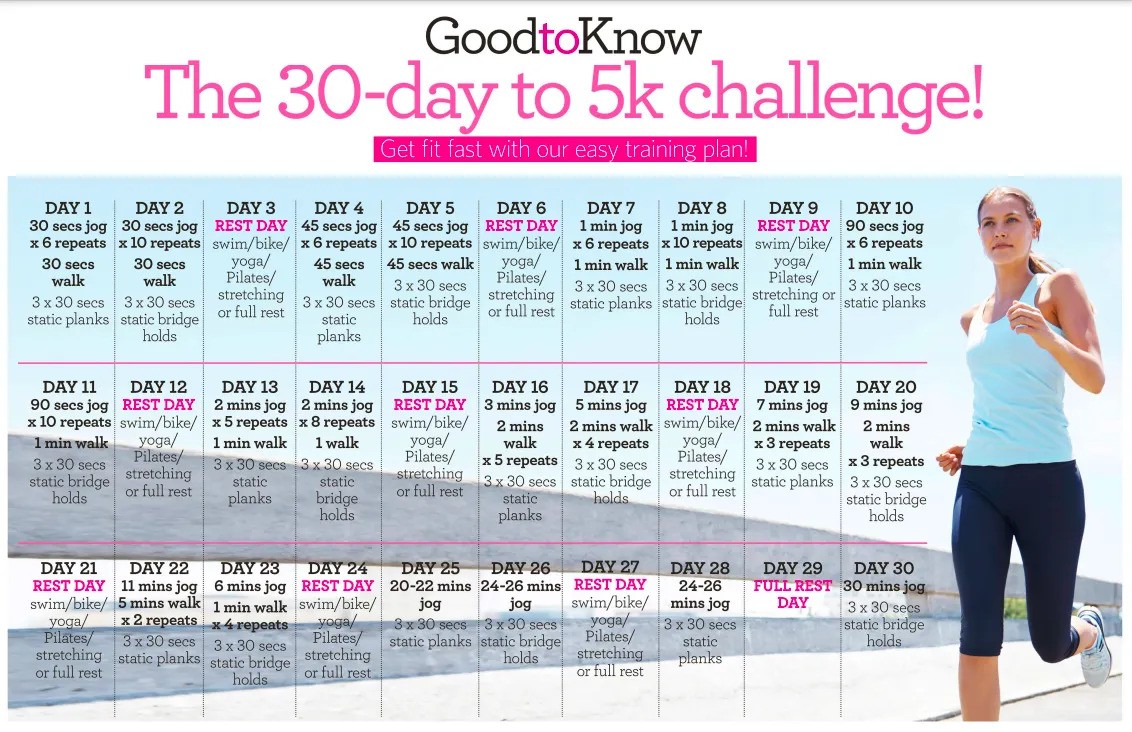
The 30-day 5k challenge
How to get started
Getting started with the 5k plan couldn’t be easier. All you need to do is download the 30-day couch to 5k challenge plan, print it off and stick it up somewhere that will motivate you to do your daily exercise. We recommend the fridge or popping it next to your bedside table – basically somewhere that you'll definitely come across during your daily routine. A positive and determined attitude to succeed is also encouraged to get going. As is some practical footwear (running trainers are ideal) and comfy and breathable gym clothing. Once you've dressed the part (and done a few stretches) simply read our easy-to-follow exercises as outlined on the sheet so you’ll know exactly what to do. Then it's ready, set, go!
5 tips for new runners to successfully complete the Couch to 5k challenge
1. Walk and run
There's a misconception that in order to be a successful runner, you must be running for the entire duration of your workout, but that simply isn't the case, and in fact, walking for some parts of your training is encouraged. "My tips for any new runner is always, don’t be afraid to walk," says Will. "As you build your cardiovascular base, don’t feel you have to run or jog every single step. Stopping to walk for a minute is still adding to your training and ability to run further next time out. It’s better to run and walk 3km in total than run 2km and call it quits."
Charlotte Arter, ambassador for running apparel specialist Saucony UK agrees: "I recommend you build in intervals of running and walking to get your confidence and then go from there. Once you’ve mastered running for a minute and then walking for a minute, you can start to increase the time you spend running and look to increase your distance at the same time."
2. Set yourself goals
Setting goals for a 5k challenge provides motivation, structure and a sense of achievement when you reach them! Clear objectives help you stay focused, track your progress and push yourself.
Parenting advice, hot topics, best buys and family finance tips delivered straight to your inbox.
Charlotte tells us: "[Your goals] can be short term and long term – it always helps to have something tangible to work to. Once you meet your goal of running for a longer period of time without walking, and then eventually running a 5k distance without stopping, your next target can be improving on your time for the 5k. The main thing is not to rush to meet your goals and to always look back on what you have achieved, big or small, they are all achievements!"
3. Keep it interesting
When starting out as a runner with your first 5k in mind, it’s important to keep things fresh – and that includes the routes that you run. The last thing you want to do is get bored of running when you’ve only just begun. Charlotte explains: "Running is a great way to get to know your area, so make sure you are making the most of it. Find out the best routes through apps like Strava and MapMyRun where other runners share their favourite loops."
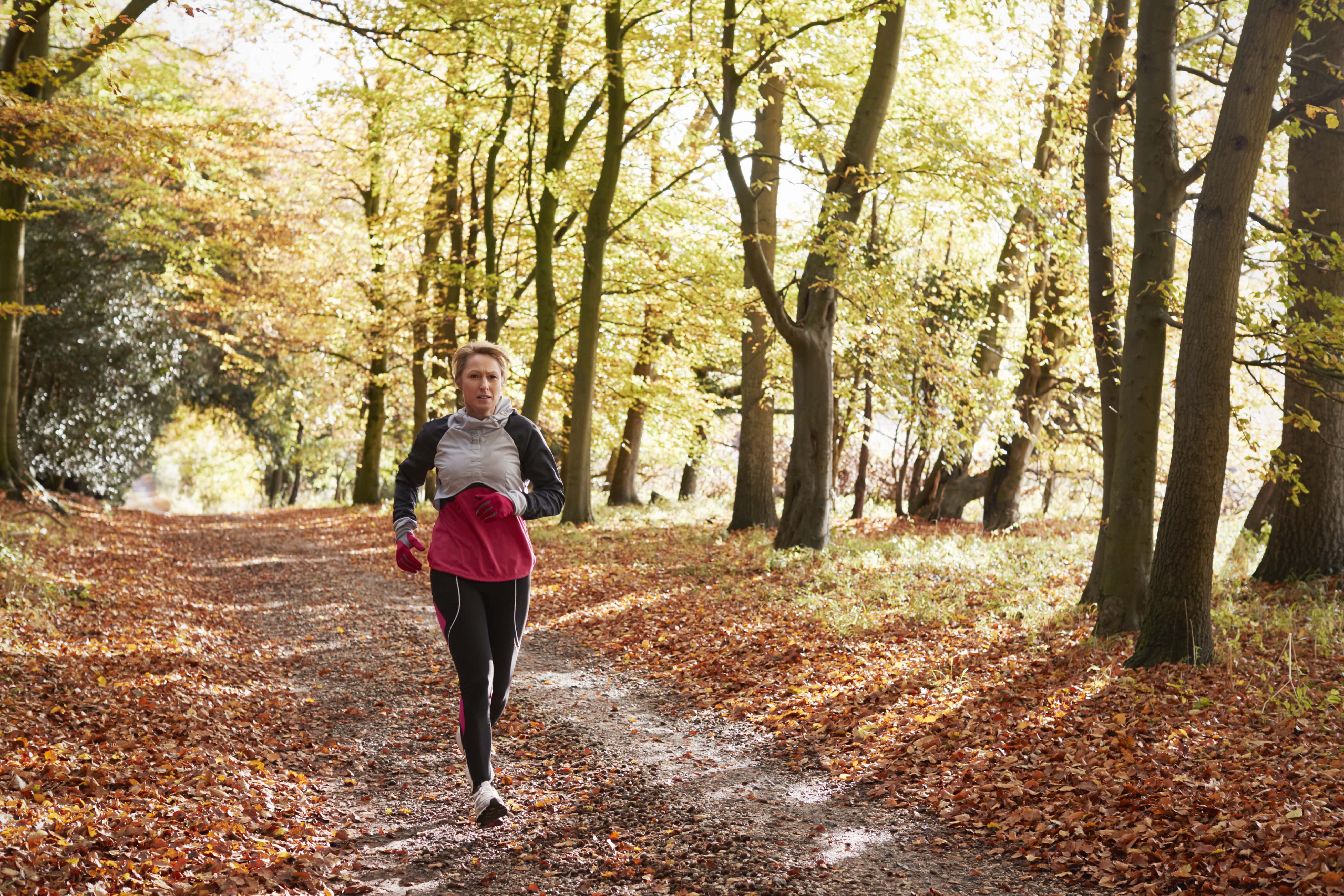
New mum running through Autumn woodland training for the Couch to 5k challenge
4. Consistency is key
When training for a 5k, consistency is crucial as it helps to build endurance, improves your running technique and minimises the risk of injury. Charlotte says: "Everyone lives such busy lives, but if you can establish a weekly routine where you’re running regularly, it'll make a huge difference to your end result. Sometimes, the last thing you might want to do is pull on your trainers, but the feeling of achievement and endorphin release after a run (of any distance) makes it all worth it." Running releases a surge of 'feel-good' hormones into your blood, which may explain why you feel happy after at the finish line, also known as the runner's high, according to research published in the National Library for Medicine.
5. Think about your fuel
You may find that if you go out first thing, you don’t need any food beforehand. But often, eating before exercise – particularly an hour or two before – can help boost your performance. Charlotte's go-to is a bowl of porridge, and this is a healthy breakfast choice if jogging in the morning. A Harvard medical school study highlights that eating carbohydrates before running is wise, as this is what your body turns into fuel – and regular oats contain up to 70 percent of carbohydrates. Similarly, a generous helping of good fats are important, with one 2018 study published in the Journal of the International Society of Sports Nutrition showing that the body also uses fats to fuel your workout (known as 'fat oxidation'), so that might look like a spoonful of peanut butter in your oats or some avocado on toast.
Fitness expert Kelly Marshall agrees that eating well outside of your training is also imperative: "It’s true that you can’t out-train a bad diet. To get the maximum benefit from your 5k plan, you need to make sure your nutrition is as focused as your exercise. The Nutracheck App is a must-have tool if you want to monitor your diet and track your calorie intake". Hydration is also imperative, with the handy H20 helping us to prevent injury and illness. A different 2018 study published on BMC Health warns that dehydration when active can cause fatigue, headaches, sickness and muscle cramping. "Making sure you drink plenty of water long before going out on a run or any form of exercise is also key," adds Charlotte.
3 things to avoid when you start running again
1. Neglecting your warm-up
It sounds obvious, but having warm muscles before you start running will really help you get the most out of your training, so skipping your stretches is not a good idea. "There's nothing that kills your progress like an injury," warns Will. "Ensure you are buying into some stretching and a light warm up before you get out the door. It can be as simple as five minutes extra work, but is worth it in my books." One study in the Journal of Sports Medicine found that a good warm up opens up your blood vessels and gets precious oxygen to your muscles which will aid both flexibility and efficiency, whilst another 2018 study published in the Journal of Exercise Rehabilitation (JER) stated that stretching before helped prepare for a better exercise performance.
2. Ignoring pain
If there's one thing you take away from this feature, make it this: always listen to your body. A few aches post-run is normally nothing to worry about. But if you're experiencing severe continuous pain in one area it may be an injury that needs attention. Be sure to get it checked out by a doctor before running again.
3. Giving up
As we already mentioned, consistency is the key to success when it comes to completing the Couch to 5k, so if you do miss a training session, don't beat yourself up, just be prepared to go for it the next day. "Starting to run can be a scary concept," assures Kelly. "But the key is following a systematic, progressive plan to support your body and get it accustomed to impact and an increasing distance." It's important to set realistic goals with the Couch to 5k plan, so don't expect a personal best every time, especially when you're tired from looking after a newborn or toddler.
How many days a week should I run to train for 5K?
The magic number is around three times a week when working up to a 5k distance. New mums are busy with a capital B, so "if you can only make time for one or two runs per week, that’s still an amazing achievement," Steph says. "During our 0-5km programme, we guide you through a slow run, interval run and then you’ll finish off with your long run for the week. It can also help to run in different locations, to not only keep things interesting, but help your body adapt to different surfaces and surroundings," Steph recommends.
What happens if I run 5km every day?
There is nothing stopping you from running 5km a day if you want to, but just be sure you're warming up (and cooling down) to avoid injuries. That said, rest days from exercise are so important for your body and mind. You don't have to be sitting on the sofa either (which is very unlikely with a toddler!), so you could try active rest days, where you engage in very light activity such as walking or yoga. According to a paper published in the Journal of Sports Sciences, taking a break from exercise can help to prevent cramping and fatigue in your muscles.
Steph is a big advocate for rest days too: "No matter what movement you enjoy, whether it’s running, Pilates or strength, I wouldn’t recommend striving to do it every single day. Rest days are so important and it’s also beneficial to mix up your movements. When I’m focusing on running, I’ll weave in either a Pilates or strength workout to my weekly routine to help strengthen my muscles to support my runs."

Steph is the chief community officer, podcast host and and co-founder of Kic wellness app. As a mum herself, Steph has played a vital role in launching Kic’s KICBUMP pre and postnatal workout programme, guided by a hand-picked team of trainers and health experts, and has specialist knowledge on topics around postpartum exercise. And, KICRUN a 0-5km training plan.
Working alongside best friend and co-founder Laura Henshaw, the pair first met working as models during Melbourne Fashion Week in 2013, bonding over the mutual physical and mental struggles they faced with body image triggered by the modelling industry, which encouraged weight stigma, restrictive eating and excessive exercise. This ignited their passion to start a movement that would help so many others build body confidence in a way that works best for them.
Continue reading

From building healthy family relationships to self-care tips for mums and parenting trends - Daniella also covers postnatal workouts and exercises for kids. After gaining a Print Journalism BA Hons degree and NCTJ Diploma in Journalism at Nottingham Trent University, Daniella started writing for Health & Wellbeing and co-hosted the Walk to Wellbeing podcast. She has also written for Stylist, Natural Health, The Sun UK and Fit & Well. In her free time, Daniella loves to travel, try out new fitness classes and cook for family and friends.
